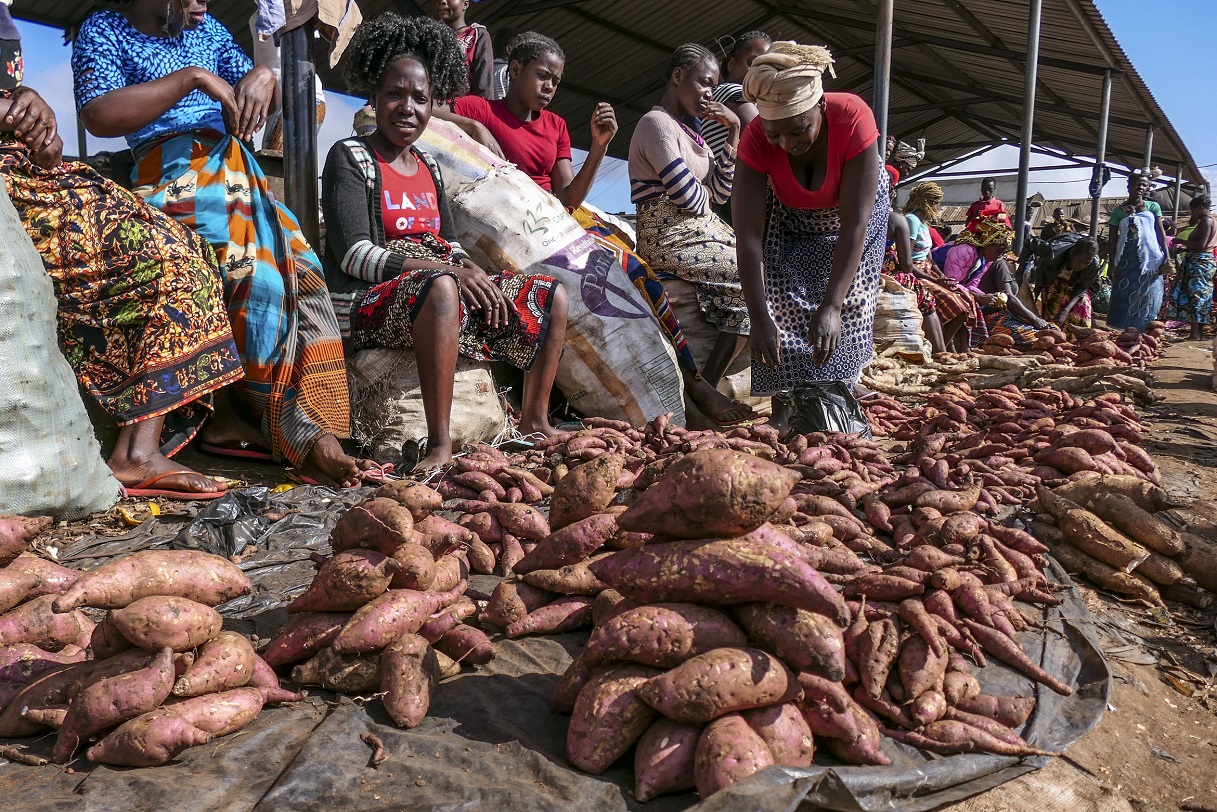Mozambique: Lack of budget maps prompts postponement of PESOE debate in parliament - Carta
Mozambique: Cassava, sweet potato and yam replace bread as prices rise

Thousands of families in Chimoio, the capital of Manica, have swapped bread for cassava, sweet potato or yam to circumvent the rising prices of imported wheat., 20 May 2022. The 38 Milímetros market, the main informal market in Chimoio, registers a great movement of people, many inclined to choose and buy sweet potato or cassava, packed in raffia bags. [Photo: Andre Catueira/Lusa]
Pedro Farnela, 58, a polygamist with a household of 21 people, returns home in central Mozambique carrying a plastic bag with sweet potato to replace bread due to price increases.
A war in another hemisphere, some 8,000 kilometres away, in Ukraine, takes him on a different path than before, to a bakery in a suburb of Chimoio, the capital of Manica province, because inflation has forced him to exchange bread for sweet potato and more.
The eating habits of his large family – four wives, 14 children and three granddaughters – have changed since the price of bread rose from eight to 10 meticais (€0.15) almost a month ago.
“With that price of bread, I would no longer be able to give my family a meal. But buying cassava or sweet potato for 50 or 70 meticais I manage”, without anyone being left out, Pedro Farnela tells Lusa, laughing at the ironic twist.
“Generally we used to buy bread to go with the fad,” because “sweet potato has always been more affordable,” the cobbler explained.
“But now the price of bread has become unsustainable for my family”, and no one goes in for fashion anymore, because, at the end of the day, it’s the bills that count, especially in one of the poorest countries in the world, where half of the 30 million inhabitants find it difficult to get enough to eat.
For bread alone, Pedro Farnela needs to spend 210 meticais (€3) every day, almost three times what he spends on buying tubers.
The remainder is redistributed to buy other basic foodstuffs, the prices of which have also soared in recent weeks.
Thousands of families in Chimoio, the capital of Manica, have swapped bread for cassava, sweet potato or yam to circumvent the rising prices of imported wheat.
“The price of bread was already unbearable,” Marcelino Daude, a street vendor, tells Lusa.
“If I had to continue buying, I would have to divide a loaf of bread between two people and with the adulterated weight, it would not be a meal,” he says, alluding to the reduction in the size of the bread, a way producers found to accommodate the rise in raw materials without greater increases in the retail price.
Daude earns an average of 130 meticais (€2) a day, selling used clothes on the streets of Chimoio and the daily amount must be spread over three meals for a family of five, including the three young children.
Early in the morning, the ’38 Millímetre’ market – named after the anti-aircraft gun in a neighbouring barracks -, the main informal market in Chimoio, registers a large movement of people, many inclined to choose and buy sweet potato or cassava, packed in raffia bags.
The scene contrasts with the bakeries that used to have queues and are now almost empty.

“Now people prefer to buy sweet potato instead of bread. With the increase, many can no longer buy the same amount,” Juvêncio Almeida, a bread retailer at the market, who is losing customers to tubers, tells Lusa.
João Marcelino, another bread seller, whose stall borders a tuber seller, explains that “the 10 meticais sweet potato serves as a meal for a family of five”.
“Bread, on the other hand, can only be consumed by one or two people at most”, he adds, acknowledging that “the sale of bread is becoming slow and difficult”.
The tuber business is attracting sellers from other provinces of the country, who want to buy the product to be resold in the southern provinces of the country, particularly Maputo, and also in the north, such as Nampula and Cabo Delgado.

In April, inflation in Mozambique accelerated to 7.9%, the highest in the last four and a half years.
The record was achieved after a rise of 6.7% in March, “reflecting the rise in fuel and food prices,” the Bank of Mozambique said.
Despite the price rises, the central bank expects inflation to remain in the single-digit range in the medium term, “despite the high risks and uncertainties associated with these projections,” particularly with the war in Ukraine, it said.













Leave a Reply
Be the First to Comment!
You must be logged in to post a comment.
You must be logged in to post a comment.